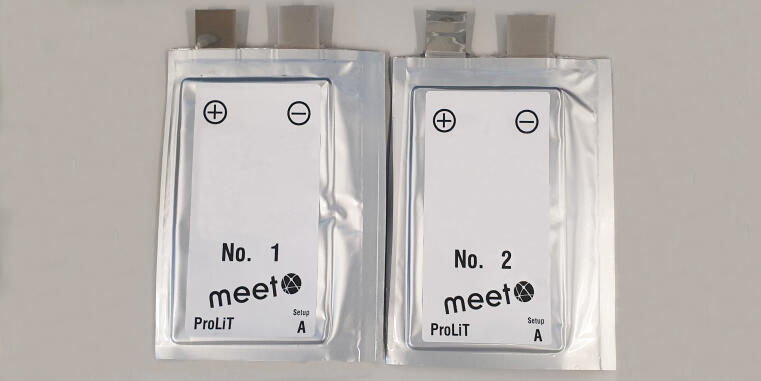MEET Team Develops Method for Dry Processing of Electrodes
To produce electrodes more environmentally friendly and cost-effectively, scientists from MEET Battery Research Center at the University of Münster has developed a method for their dry processing. As a result, expensive and partly toxic organic solvents such as N-methylpyrrolidone (NMP) can be completely avoided. The process is an outcome of the cooperation project ProLiT (process and material development of lithium ion battery cathodes for large-scale dry coating), which runs until April 2025 and is funded by the German Federal Ministry of Education and Research.
Assembly of Multilayer Pouch Cells with Dry-Processed Electrodes
To develop the dry processing method, the MEET team conducted research in particular on innovative materials and their composition as well as mixing processes. The initial focus was on identifying a suitable binder: With polytetrafluoroethylene (PTFE), they used a high-temperature plastic that can be plastically deformed and defibered at elevated temperatures under the effect of mechanical impact, thereby bonding the remaining electrode composites together – similar to a cobweb. At the beginning of the process, the research team mixed the electrode materials such as active material, conductive carbon black and binder to produce a homogeneous granulate. This granulate was then formed into a film in a heated calender and processed until the required film thickness and mass loading were achieved. The film was then applied onto the current collector by pressure.

The project partners, among them the Institute for Particle Technology (iPAT) at the TU Braunschweig and the automotive concern BMW, scaled up this process and produced double-sided electrodes. “As a result, we were able to develop the formulation for dry processing and then successfully assemble multilayer pouch cells,” summarizes MEET researcher Dr Katrin Junghans the results of the ProLiT project.
Another advantage: Compared to wet-processed electrodes, a lower binder content is required to manufacture dry-processed electrodes. As a result, they achieve a higher energy density and are therefore promising for applications with high energy demands. The scientific team still identifies potential for optimization in particular in understanding the process-related microstructure of the electrodes and their influence on long-term cycle stability in more detail.
Strong Cooperation of Industry and Academia
Since 2022, partners from industry and academia have been working on the process and material development of lithium ion battery cathodes for large-scale dry coating within the ProLiT project. Other participants include Custom Cells Holding GmbH, Coperion GmbH, Matthews International GmbH (Saueressig Engineering), Umicore NV/SA, DAIKIN Chemical Europe GmbH, IBU-tec advanced materials AG and Maschinenfabrik Gustav Eirich GmbH & Co. KG.

